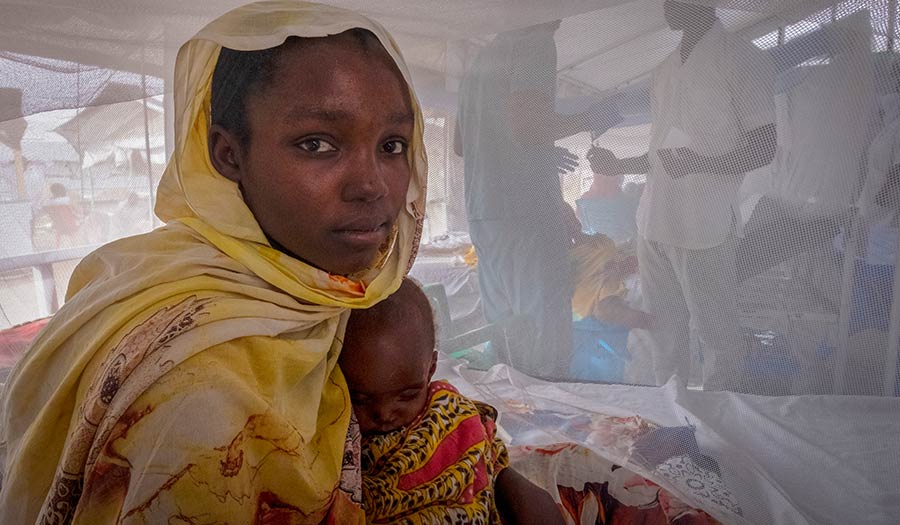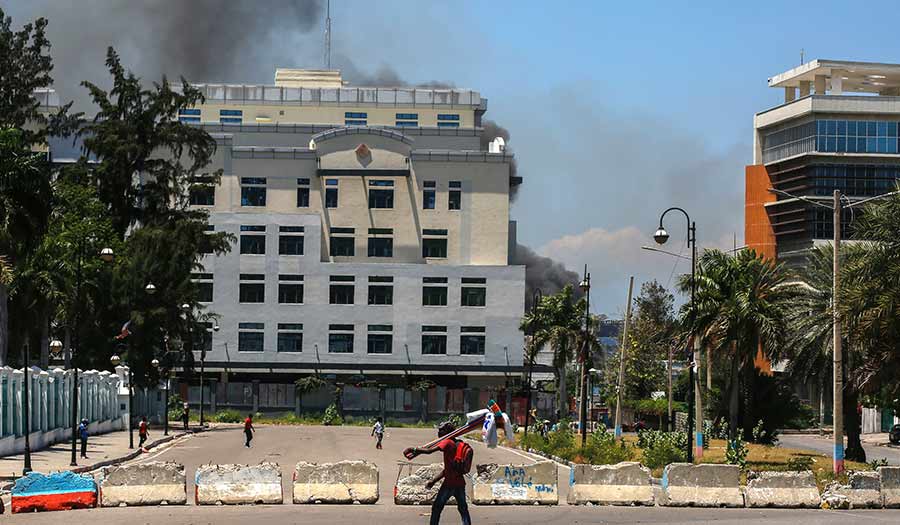 AP/Patricia Simon
AP/Patricia Simon
World News Desk
Learn the why behind the headlines.
Subscribe to the Real Truth for FREE news and analysis.
Subscribe NowMETCHE CAMP, Chad (AP) – The war in Sudan began a year ago. In a remote camp for tens of thousands of people who have fled into neighboring Chad, the anniversary is marked by near starvation.
Assadig Abubaker Salih is a 42-year-old mother of six. The family survived the hot, dusty journey from their home to this sprawling camp of wind-whipped blue tents stretching in rows toward the horizon.
“We are in a very bad situation. We have suffered since we left our country. My husband died,” she said. “There is nothing here. We need the essentials. We don’t even have sugar.”
Back home, Sudan’s military, led by General Abdel Fattah Burhan, is fighting the paramilitary group known as Rapid Support Forces, commanded by General Mohammed Hamdan Dagalo, for immensely greater resources—including power over the country’s more than 45 million people.
Close to 9 million people have fled their homes, according to the United Nations, and more than 1 million have left the country. Thousands have been killed in a conflict overshadowed by the ones in Gaza and Ukraine. The UN says it has asked for $2.7 billion in funding to respond to humanitarian needs but has received $155 million—or 6 percent.
“It has been everyday Sudanese who have—often at great personal risk—stepped up to support each other,” Eatizaz Yousif, country director with the International Rescue Committee, said in a joint statement by aid groups urging the world to give more.
The UN has warned of an impending generational catastrophe. An estimated 3 million Sudanese children are malnourished. About 19 million children are out of school. A quarter of Sudan’s hospitals are no longer functioning.
Aid organizations say women and children are bearing the worst of the conflict.
Even here, across the border, resources are stretched thin after more than 570,000 Sudanese arrived over the past year. Aid workers warn they are set to run out of some supplies within weeks. Shortages of water and ways to keep clean mean a growing risk of disease.
A growing number of children are arriving at the pediatric unit run by the Doctors Without Borders charity with pulmonary complications, a result of the harsh environment. The organization has also documented rising cases of hepatitis E, which can be deadly for pregnant women.
“Many, many of our babies are severely malnourished,” said Cordula Haffner, the Doctors Without Borders hospital coordinator at the camp. “The reason is hygiene, not enough food, not enough water. This is a crisis that will continue. We will see even more children like this.”
More than 16,000 children younger than 5 arriving in Chad from Sudan have had severe acute malnutrition, according to the UN—a stage where the effects of hunger are clearly visible.
Many people in this camp fled some of the conflict’s worst fighting in Sudan’s vast western region of Darfur. But the most desperate are trapped behind the front lines.
“We are seeing a catastrophe unfolding in North Darfur, where our teams have estimated that 13 children are dying each day of malnutrition and related health conditions at a camp for displaced people,” Avril Benoit, executive director of Doctors Without Borders in the U.S., said in a statement. She urged Sudanese authorities to stop blocking aid.
Some Sudanese manage to get help in time. One mother of six, Rachid Yaya Mohammed, said she came to the hospital at this camp in Chad because she is six months pregnant.
Two of her smallest children—twins—slept beside her.
Conditions are expected to worsen in the coming lean season between harvests, when food reserves are depleted and rains drive up rates of malaria.
Sudan plunged into chaos a year ago when clashes erupted in the capital, Khartoum, and spread.
In Darfur, brutal attacks by the Arab-dominated Rapid Support Forces on ethnic African civilians have revived memories of genocide.
Two decades ago, as many as 300,000 people were killed and 2.7 million were driven from their homes largely by government-backed Arab militias. The paramilitary Rapid Support Forces grew out of those militias known as the Janjaweed who were accused of widespread killings, rapes and other atrocities.
Now, prosecutors at the International Criminal Court say there are grounds to believe both sides in the current conflict are committing war crimes.
West Darfur, especially its capital city of Geneina, has witnessed some of the worst atrocities including mass killings and rampant sexual violence against the African Masalit tribe, according to UN experts. The AP has reported that militias launched waves of attacks on Geneina and other towns, taking men away and burning their homes.
- World News Desk
- AMERICAS
 Haiti’s Surge in Gang Violence Has Led More Than 53,000 to Flee the Capital in Less Than Three Weeks
Haiti’s Surge in Gang Violence Has Led More Than 53,000 to Flee the Capital in Less Than Three Weeks
More on Related Topics:
- Global Hunger Monitor Says Famine in War-torn Sudan Is Spreading
- Nigeria’s Hunger Crisis Deepens with 33 Million at Risk, Report Says
- Libya’s Instability Will Worsen Further Without a Unified Government and Elections, UN Envoy Says
- U.S. Warns a Famine in Sudan Is on Pace to Be the Deadliest in Decades as the World Looks Elsewhere
- U.S. Hands Over Its Last Military Base in Niger to the Ruling Junta


